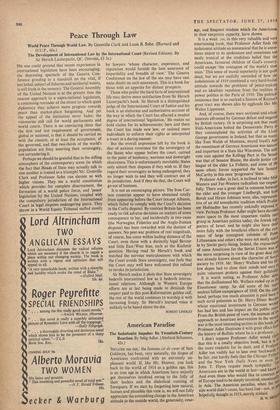Peace Through Law
World Peace Through World Law. By Grenville Clark and Louis B. Sohn. (Harvard and O.U.P., 60s.) No one could pretend that recent experiences in international legislation have been encouraging; the depressing spectacle of the Geneva Con- ference grinding to a standstill on the vital, if not lethal, subject of fisheries and territorial waters, is still fresh in the memory. The General Assembly of the United Nations is at the present time the nearest approach to a supra-national legislature, a continuing reminder of the extent to which quiet diplomacy may achieve more progress towards peace than market-place bargaining. And yet the appeal of the institution never fades; the visionaries still call for world parliaments and world courts. There is no convincing them that the first and last requirement of government, global or national, is that it should be carried on with the consent, or at least the acceptance, of the governed, and that two-thirds of the world's population are busy asserting their sovereignty, not surrendering it.
Perhaps we should be grateful that in the stifling atmosphere of the contemporary scene (in which the fact that Heads of State may actually talk to one another is treated as a triumph) Mr. Grenville Clark and Professor Sohn can elevate us with higher visions. They see a world constitution which provides for complete disarmament, the formation of a world police force, and 'peace' legislation by the United Nations, coupled with the compulsory jurisdiction of the International Court in legal disputes endangering peace. They throw in a World Equity Tribunal staffed mostly by lawyers 'whose character, experience, and reputation would furnish the best assurance of impartiality and breadth of view.' The Geneva Conference on the law of the sea may have cast some doubt on such assurances. This is a book for those with an appetite for distant prospects.
Those who prefer the hard facts of international life may derive more satisfaction from Sir Hersch Lauterpacht's book. Sir Hersch is a distinguished judge of the International Court of Justice and his book is an elaborate and authoritative account of the way in which the Court has effected a modest degree of international 'legislation.' He makes no bold claims for its achievements; here and there the Court has made new law, or assisted mere individuals to enforce their rights or interpreted a treaty in a daring manner.
But the overall impression left by the book is that of anxious reverence for the sovereignty of the States who appear before the court, carried to the point of hesitancy, wariness and downright elusiveness. This is unfortunately inevitable; States only submit their disputes if they wish to. If they regard their sovereignty as being endangered, they no longer wish to and they will contract out of its jurisdiction. And if they do that, the Court will go out of business.
It is not an encouraging picture. The Iron Cur- tain countries appear to have abstained totally from appearing before the Court (except Albania, which failed to comply with the Court's decision in the Corfu dispute). By contrast Britain has been ready to risk adverse decisions on matters of some consequence to her, and incidentally in two cases (the Norwegian Fisheries and the Anglo-Iranian disputes) has been rewarded with the dustiest of answers. No post-war problem of real magnitude, of course, has come within hailing distance of the Court, even those with a distinctly legal flavour and little East/ West bias, such as the Kashmir question. Having read Sir Hersch's book and watched the nervous meticulousness with which the Court avoids State sovereignty, one feels that the Court may well have welcomed this refusal to invoke its jurisdiction.
Sir Hersch makes it plain that State sovereignty bedevils international law as it bedevils interna- tional relations. Although in Western Europe efforts are at last being made to diminish the respect paid to this post-Reformation golden calf, the rest of the world continues to worship it with increasing frenzy. Sir Hersch's learned voice is unlikely to be heard above the din.
ROBERT LINDLEY


































 Previous page
Previous page